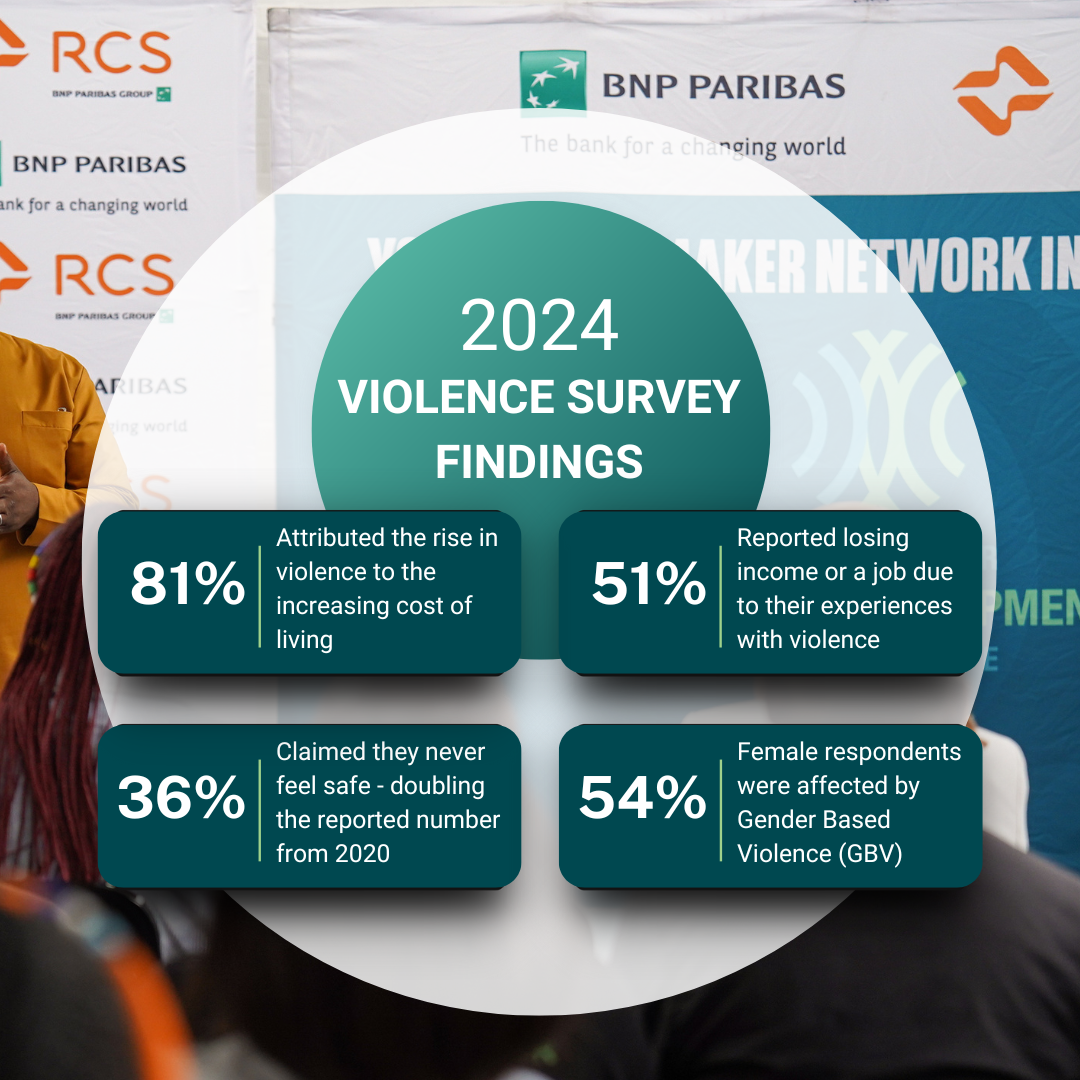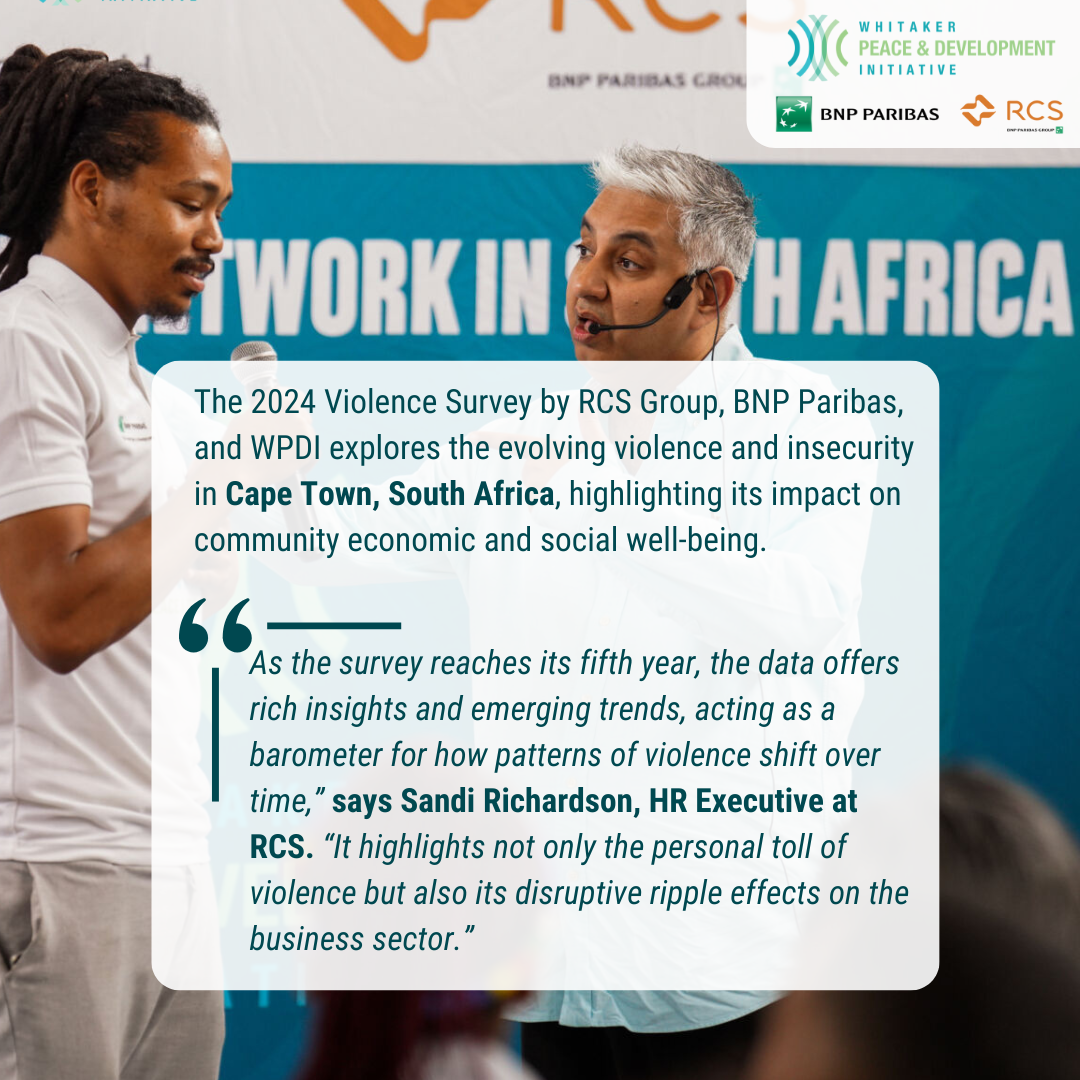December 5, 2024 – In its fifth consecutive year, the 2024 Violence Survey, a collaborative effort between RCS Group, BNP Paribas, and WPDI, brings forth a nuanced understanding of the evolving landscape of violence and insecurity in the communities of Cape Town and its ramifications for businesses. This year’s findings, while signalling a positive trend of decreasing violence across key categories, shed light on the persistent impact on the well-being of communities and the mental health of employees.

Since its launch in 2020, the Violence Survey, a collaborative initiative between WPDI and RCS Group, has provided a detailed exploration of how violence affects vulnerable communities and disrupts business operations in South Africa. This year’s survey, now in its fifth edition, delves deeper into these issues, tracking evolving trends and offering valuable insights for RCS and WPDI as well as any interested stakeholder.
The survey focused on two key groups: individuals from violence-affected communities in Gauteng, KwaZulu-Natal, and the Western Cape, and corporates spanning industries such as services, construction, retail, hospitality, financial services, and manufacturing.
“As the survey reaches its fifth year, the data offers rich insights and emerging trends, acting as a barometer for how patterns of violence shift over time,” says Sandi Richardson, HR Executive at RCS. “It highlights not only the personal toll of violence but also its disruptive ripple effects on the business sector.”
The Human Effect
Siphathisiwe Dhlamini, Conflict Resolution and Peace Building Expert at WPDI says that 2024 saw a decrease in the number of crimes, but an increase in the severity of violence. “The Violence Survey findings mirror the Q1 2024 crime statistics published by SAPS, which show that extreme violence has become more prevalent,” she said.
A local initiative, the Survey nevertheless highlights a troubling escalation in the severity of violent incidents across South Africa. Reports of being threatened with a weapon rose from 57% in 2023 to 62% in 2024, while physical attacks resulting in injuries increased from 51% to 53% over the same period. Most alarmingly, kidnappings and abductions jumped from 11% in 2023 to 16% in 2024, with the Western Cape emerging as a hotspot for these crimes.
The pervasive sense of insecurity among respondents underscores the gravity of the situation. An overwhelming 82% reported feeling unsafe in their neighborhoods, with 81% attributing the rise in violence to the increasing cost of living. Even more concerning, 36% of respondents in 2024 claimed they never feel safe—double the 18% recorded in 2020—reflecting a deepening crisis of safety and stability in affected areas.
These insights emphasize the urgent need to address the root causes of violence and its far-reaching consequences. The findings serve as a call to action for communities, policymakers, and businesses alike to collaborate in building safer, more resilient environments.
The Effect on Livelihoods
According to Dhlamini, the 2024 survey assessed the effects of violence on four critical aspects of livelihoods: loss of income or employment, delays in reaching work or education, absenteeism from work or studies, and physical or mental limitations in workplace performance.
“The survey reveals that violence continues to profoundly affect livelihoods and well-being,” says Dhlamini. “In 2024, over half of respondents (51%) reported losing income or a job due to their experiences with violence—a worrying 12% increase compared to 2023.”
The findings also highlight the pervasive nature of gender-based violence (GBV), with 46% of respondents experiencing GBV in 2024. The impact is disproportionately felt by women, with 53% of female respondents affected, compared to 38% of men.
“Tackling GBV requires strategic and targeted interventions from multiple stakeholders across society,” says Dhlamini. “This urgency is particularly acute in the workplace, where only 54% of women feel their employers provide adequate support. Men also voiced concerns about the ways violence jeopardizes their income and job security.”
The Effect on Businesses
Violence continues to create ripple effects that challenge corporate South Africa, according to Sandi Richardson. Nearly half of corporate respondents (46%) identified community violence as a significant driver of employee absenteeism, with 67% acknowledging that absenteeism directly hampers productivity and 25% noting its negative impact on employee career growth.

Interestingly, there has been a decline in the number of corporates perceiving community violence as affecting employee presenteeism, well-being, and career development. Richardson suggests this “softening” could indicate either an underestimation of the issue or an adaptation by businesses to ongoing challenges.
However, support for employees living in violent areas appears to be decreasing. The percentage of corporations that were reported to be actively taking measures dropped from 72% in 2023 to 62% in 2024. Despite this decline, Richardson points out that many companies continue to prioritize initiatives such as staff transport, accommodation, and counseling. There has also been a notable increase in psychological and emotional support, reflecting a growing recognition of the need to address the deeper impacts of violence on employees.
Richardson concludes: “Through initiatives such as the Violence Survey, RCS – together with our partners BNP Paribas and WPDI – strives to gain a deeper understanding of the societal issues plaguing South Africa. With the support and collaboration of all stakeholders, we can use this knowledge to tackle these problems, resulting in a safer South Africa for all.”
In partnership with
